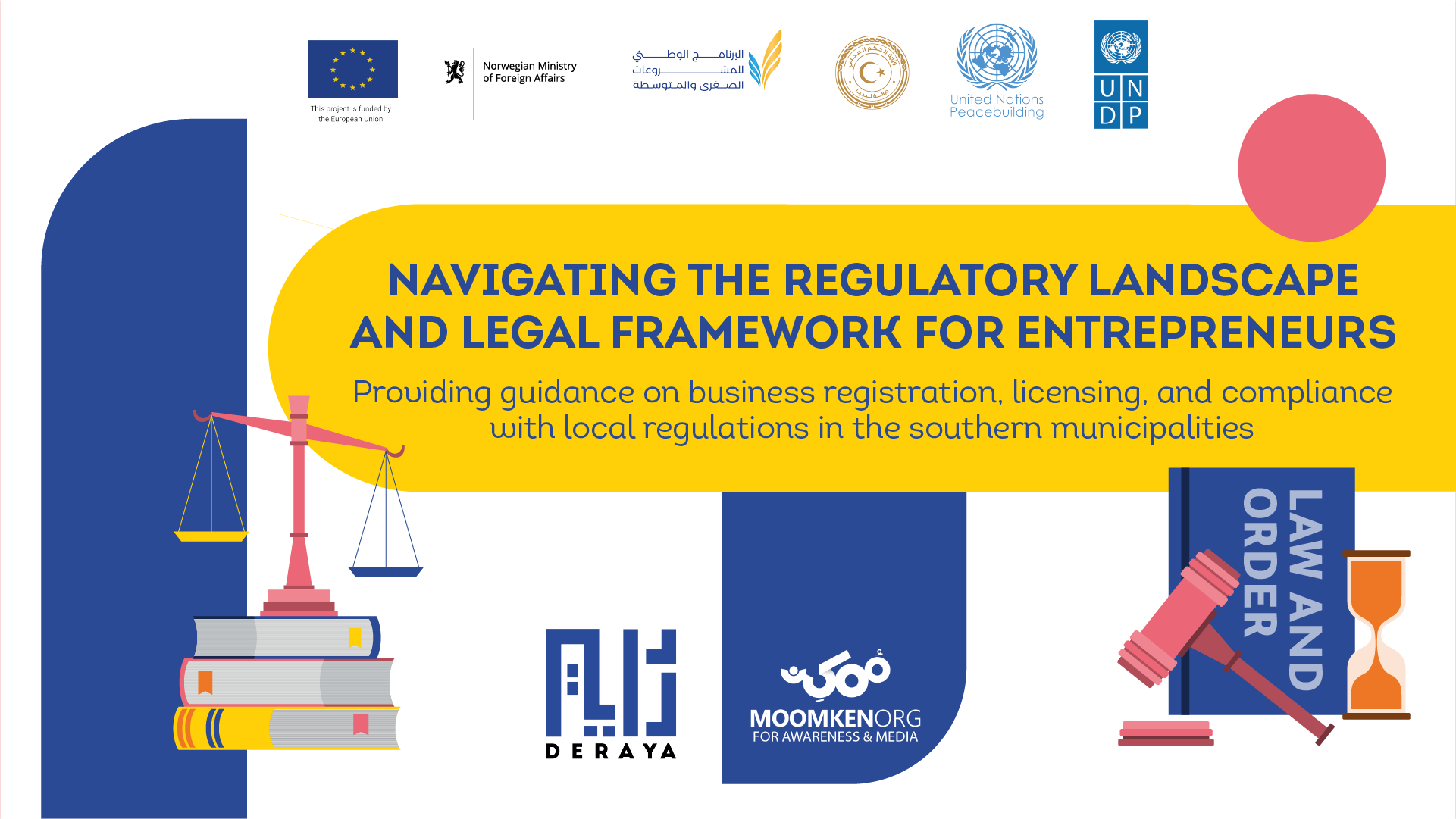The nascent entrepreneurial environment in Libya is in its early stages of development. Nevertheless, it shows significant potential for growth and innovation. With the increasing number of startups, accelerators, co-working spaces, and stakeholders, the entrepreneurial landscape in Libya is gradually evolving.
In this context, the second online webinar was organized as part of the Deraya Entrepreneurship Initiative's seminar series under the title "Your Opportunity in Libya: What's Your Opportunity as an Entrepreneur?" In this webinar, the spotlight was shed on the resources available in Libya that will serve future entrepreneurs, the entrepreneurial programs that support startups, and the various services that entrepreneurs can leverage to build their projects.
Successful entrepreneurs from Libya participated in this webinar, where they talked about the supportive economic environment for entrepreneurship and how to capitalize on available opportunities for thriving with startup projects. Among the speakers in this seminar were Salem Al-Saeh, an accomplished IT leader and innovative entrepreneur, and Nouran Al-Arabi, a project manager and head of community development at Tatweer Research.
Entrepreneurial Environment in Libya
The startup ecosystem in Libya faces challenges due to limited infrastructure resulting from political unrest. However, despite these obstacles, the country possesses a remarkable entrepreneurial spirit among its youth. Entrepreneurs in Libya are increasingly seeking to seize opportunities, establish their own businesses, and contribute to the growth of the national economy. Efforts have been made to enhance skill development and entrepreneurial education, with universities and training institutions offering courses focused on entrepreneurship and innovation.
The local market presents significant opportunities for startups to address pressing needs in sectors such as agriculture, healthcare, renewable energy, and tourism. Despite the challenges, the entrepreneurial spirit, coupled with initiatives related to skill development and local opportunities, holds the promise of advancing the startup ecosystem in Libya.

- Incubators and Accelerators
There are several incubators and accelerators in Libya that support entrepreneurs and provide them with the necessary environment and resources for growth and development. Among these entities:
BINA Incubator: BINA Incubator is a well-known center aimed at supporting startups and promoting innovation in Libya. BINA offers financial, technical, and training support to startups, providing the necessary space and an encouraging atmosphere for work, collaboration, and knowledge exchange.
In addition to that, we have these accelerators and incubators that are doing excellent work in the entrepreneurial journey:
National Program for Small and Medium Enterprises: This program focuses on supporting small and medium-sized enterprises (SMEs) in Libya.
Stream Business Incubator: Stream Business Incubator is another notable entity dedicated to fostering entrepreneurship in the country.
These entities play a crucial role in nurturing the startup ecosystem in Libya and contributing to its growth and innovation.
- Co-Working Spaces
Co-working spaces play a crucial role in providing a shared environment that brings together entrepreneurs and enhances interaction and collaboration among them. In Libya, there are several co-working spaces, including:
Eylyes Space: Eylyes Space is the first business incubator in southern Libya, offering a fully equipped co-working space to accommodate entrepreneurs and innovators. Startup companies can benefit from a suitable working environment and shared facilities, along with provided consultancy support and guidance.
Additionally, we can also mention: (Hive Space, Deraz Corner, مساحة (Masaha), نقطة (Noqta), and Space 360)
These co-working spaces contribute to fostering a collaborative and productive atmosphere for startups, enabling them to work together, exchange ideas, and grow their businesses.
- Other Enablers
Libya's efforts to drive its entrepreneurial journey towards success are not limited to co-working spaces, incubators, and accelerators alone. Various other significant stakeholders are involved, including elements within the entrepreneurship ecosystem from different institutions, initiatives, and universities. Among them:
Deraya: This is a collaborative effort involving the Ministry of Local Governance, the United Nations Development Programme (UNDP Libya), the European Union (EU), and the African Development Bank (AfDB). The initiative aims to create a dynamic environment for entrepreneurs and innovative startups in Libya. Deraya provides ambitious entrepreneurs with the knowledge and necessary support to transform their ideas into successful startups.
These collective endeavours underscore the commitment to nurturing entrepreneurship in Libya, fostering innovation, and contributing to the growth of the startup ecosystem in the country.
Libus: Libus is an online entrepreneurship school, providing a virtual educational environment for innovative Libyan youth and entrepreneurs. It offers resources, training courses, and opportunities to connect with mentors, and facilitates interaction among young individuals to assist in the initiation and growth of startups.
Tatween Research: The Development Research Company is vital in supporting entrepreneurs in Libya. They offer assistance in various areas, focusing on four main pillars: sparking interest and igniting the entrepreneurial spirit, providing training and workshops to enhance skills, creating opportunities for social networking, and introducing entrepreneurs to available funding sources.
These institutions, such as Libus and Tatweer Research, highlight the efforts to cultivate a supportive ecosystem for startups in Libya by offering education, training, networking, and access to resources.
Universities as Active Participants in the Ecosystem
In Libya, universities play a critical role as vital components of the entrepreneurship ecosystem. They guide students toward entrepreneurial paths, elucidating opportunities for self-employment and innovation. By providing an educational environment that encourages creative thinking and independent thought, universities contribute to enriching the culture of entrepreneurship and raising awareness of its significance.
Universities play a vital role in disseminating knowledge and expanding the scope of information related to entrepreneurship and startups. They equip students with the necessary knowledge to develop innovative ideas and establish their own ventures. Through dedicated courses and programs for entrepreneurship, students have the opportunity to explore their talents and enhance their entrepreneurial skills.
A notable example is Benghazi University, which is dedicated to driving the journey of entrepreneurship towards success. It contributes to the establishment of a business incubator: Benghazi University Business Incubator.
By nurturing a culture of innovation and offering resources, guidance, and specialized programs, universities in Libya are instrumental in fostering the next generation of entrepreneurs and contributing to the growth of the startup ecosystem.
What the Startup Ecosystem in Libya Provides
The Libyan entrepreneurship ecosystem focuses on attracting individuals to the entrepreneurial path by providing information and details. It offers workshops and training sessions to acquire the necessary skills for success. Additionally, co-working spaces provide affordable office spaces that promote a collaborative environment for startups, fostering innovation and dedicated work.
The entrepreneurship environment in Libya offers numerous opportunities for social interaction for entrepreneurs, helping them broaden their horizons and gain valuable insights, opening doors to new opportunities. The founder of Artisans company emphasized the importance of networking, considering it a vital aspect of entrepreneurship. It enhances connections and collaborations among like-minded individuals and potential partners. For him, the connections he forged at events like "camp Deraya" materialized into personal meetings with two individuals who eventually became his co-founders in the Artisans company, underscoring the pivotal role of networking.
Nouran also highlighted the importance of networking for entrepreneurs, saying: "We bring together people with entrepreneurial mindset with those possessing technical skills because together they will have the ability to create a business."
In summary, the entrepreneurship environment in Libya provides not only resources and training but also a sense of community and networking that are crucial for fostering innovation, collaboration, and the growth of startups.
Challenges in the Libyan Startup Ecosystem
Despite the progress made, entrepreneurs in Libya often encounter challenges. Many programs suffer from a lack of long-term vision and face difficulties in prioritizing sustainability in their strategies and future plans. A sustainable entrepreneurial program requires a supportive environment and a culture that fosters the spirit of entrepreneurship. The absence of a robust environment, including advisory networks, market access, and a favorable regulatory environment, can undermine the sustainability of these programs.
As Nouran pointed out, "When I see different places working to promote the field of entrepreneurship, I can notice that their plans are not sustainable, and personally, I believe that sustainability and having a long-term vision are essential."
- Lack of Support for Startups in Advanced Phases
The entrepreneurship ecosystem for startups in Libya may have a limited number of experienced investors interested in supporting advanced-stage startups. The local investment community might be risk-averse or focused on traditional sectors, hindering the ability of startups to secure funding for expansion. Political and economic uncertainties can also distort perceptions and increase perceived risks among potential investors, further constraining support for startups in advanced stages.
Salem Al-Saeh, one of the founders of Artisans company, identifies one of the major challenges in Libya as the absence of a financing mindset. In contrast to the Gulf region, where we see that the financing mindset is present among entrepreneurs, investors, and even governments.
- Challenges Faced by Technological Startups
Technological startups in Libya encounter several challenges, such as limited market demand, slow adoption processes, long sales cycles, and a lack of validation and appeal. Potential clients or businesses may resist embracing technological and automated solutions, impeding the growth of these companies and their ability to expand in the market.
Entrepreneur Salem Al-Saeh supports this viewpoint, by stating: “The technological solutions still require a long period to mature. This is not due to the quality of these solutions but rather because individuals and companies do not yet possess the mindset necessary to fully appreciate the need for them.”
Turning Disadvantages into Advantages for Technological Startups
Despite the challenges, opportunities abound for technological startups in Libya. The limited adoption of technological and automated solutions indicates either a market gap or untapped potential. Startups that recognize this gap and offer innovative solutions to enhance their communities can be among the pioneers providing advanced technologies, giving them a competitive edge and enabling them to build brand awareness and customer loyalty. Additionally, adopting technological solutions empowers startups to swiftly adapt to customers’ feedback and tailor their offerings to meet specific market needs.
In conclusion, it's important to acknowledge that the startup ecosystem in Libya is on a path of development and growth, with initiatives like Deraya and institutions like Tatweer Research playing pivotal roles in catalyzing the entrepreneurial environment. Universities also contribute to raising awareness and providing aspiring entrepreneurs with starting points. Despite challenges such as limited investor support and resistance to technological solutions, these obstacles can be turned into opportunities through appropriate strategies. By fostering a supportive environment and embracing innovation, Libya has the potential to establish a vibrant hub for startups, drive economic growth, and create entrepreneurial opportunities.
Watch the full recording of the webinar in Arabic
OTHER WEBINARS AND CASE STUDIES
At the beginning, we must understand that...
The Moomken Organisation hosted Hind Al-Bashari,...






